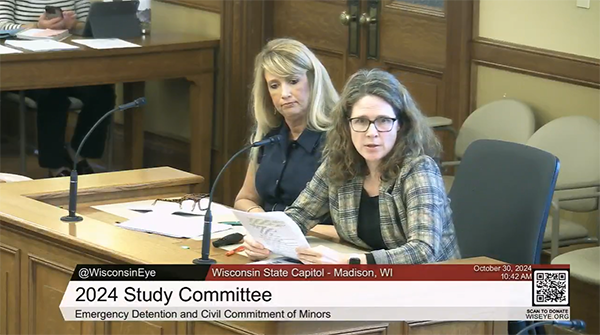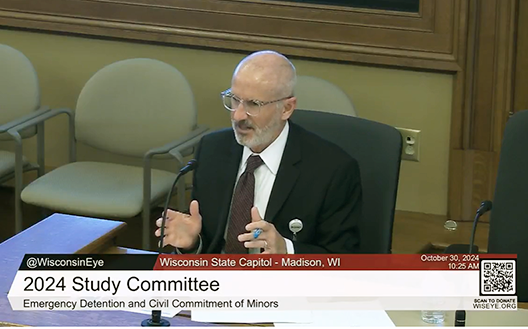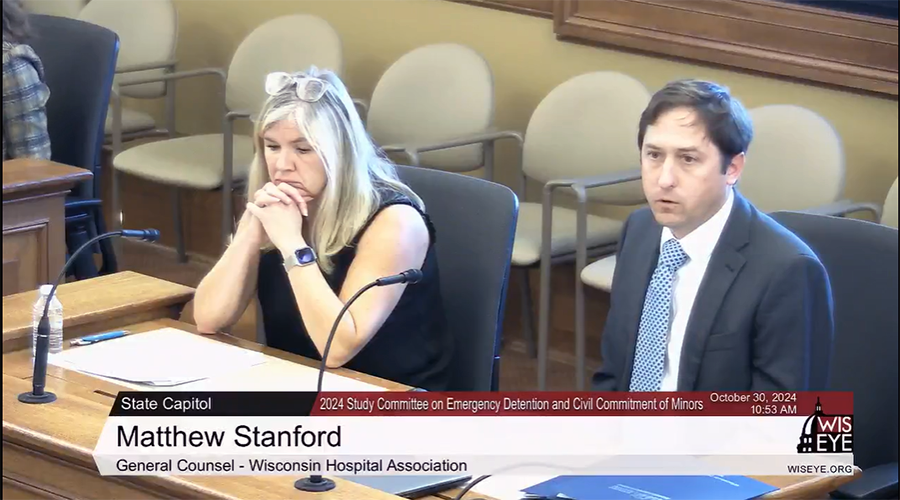Click here to view past issues
IN THIS ISSUE
- President's Column: Quality Hospital Care is an Economic Asset
- Wisconsin Health Systems Operating in the Red
- Vote on Tuesday, November 5
- CMS Webinar on 2025 Hospital Price Transparency Requirements, Recording Available
- WHA and Children’s Wisconsin Highlight Challenges, Opportunities to Children’s Mental Health Study Committee
- Spots are Filling up for the 2025 WHA Health Care Leadership Academy
- New Webinar for WHA Hospital Members Only – Beyond Advocacy
EDUCATION EVENTS
Feb. 25, 2026
2026 Advocacy DayMar. 4, 2026
Spring 2026 Annual Survey TrainingMar. 5, 2026
Operational Vacancy: An Effective Tool for Workforce PlanningClick here to view education event calendar
View more issues of The Valued Voice
Sign Up for WHA's Newsletter
WHA and Children’s Wisconsin Highlight Challenges, Opportunities to Children’s Mental Health Study Committee
In testimony to the Legislature’s Legislative Council Study Committee on Emergency Detention and Civil Commitment of Minors on Oct. 30, WHA and Children’s Wisconsin highlighted several challenges impacting children’s mental health and opportunities for policy exploration and change to remove barriers to services.
 Children’s Wisconsin Director of Integrated Care Services Robyn Woolever and Director of Acute Mental and Behavioral Health Mandy QuesnellMatthew Stanford, WHA General Counsel, followed Jodi Bloch, Mandy Quesnell, Robyn Woolever and David Whelan from Children’s Wisconsin, testified together in a joint presentation to the committee.
Children’s Wisconsin Director of Integrated Care Services Robyn Woolever and Director of Acute Mental and Behavioral Health Mandy QuesnellMatthew Stanford, WHA General Counsel, followed Jodi Bloch, Mandy Quesnell, Robyn Woolever and David Whelan from Children’s Wisconsin, testified together in a joint presentation to the committee.
 Children’s Wisconsin Director of Family Case Management David WhelanThey offered several key takeaways to the Study Committee in their presentations.
Children’s Wisconsin Director of Family Case Management David WhelanThey offered several key takeaways to the Study Committee in their presentations.
Wisconsin’s private hospitals are the safety net for many children needing acute mental health treatment, yet are highly dependent on Medicaid reimbursement that explicitly pays less than the cost to deliver the care, making sustainability of these services a significant challenge.
In 2023:
- 88% of all inpatient psychiatric admissions of minors were in private sector hospitals. Only 3% of inpatient psychiatric admissions were in county-operated psychiatric hospitals and 9% were at the state-operated Winnebago MHI.
- Medicaid was the payor of 52% of all inpatient psychiatric admissions in private sector hospitals.
- Under Wisconsin’s current Medicaid policy, Wisconsin psychiatric hospitals are required to submit federally mandated cost reports to Wisconsin’s Medicaid program, and then by current policy Medicaid pays 15% LESS than the cost of providing care for Medicaid patients.
 Children’s Wisconsin Director of State & Local Government Relations Jodi Bloch and WHA General Counsel Matthew StanfordThe frequency of longer hospital lengths of stay children with mental health needs is increasing.
Children’s Wisconsin Director of State & Local Government Relations Jodi Bloch and WHA General Counsel Matthew StanfordThe frequency of longer hospital lengths of stay children with mental health needs is increasing.
- Children’s Wisconsin’s testified that a significant cause of this is an increasing number of children with significant mental health needs no longer needing an inpatient level of care, but no post-acute care facilities are willing or able to accept those children.
- WHA presented Ch. 153 hospital discharge data from the WHA Information Center showing that since 2014, the percent of inpatient psychiatric discharges of minors greater than 3 days has increased from 76% in 2014 to 84% by Q1 2024.
- More challenging, patients no longer needing hospital care but cannot be legally discharged due to a lack of post-acute placement options result in care at the hospital that receives no or little reimbursement.
Psychiatric Residential Treatment Facilities for children were highlighted by Children’s Wisconsin, WHA, and multiple other stakeholders as a missing component of Wisconsin’s mental health continuum of services.
- Psychiatric Residential Treatment Facilities, assuming sustainable Medicaid reimbursement and commercial payor coverage of their services, can help reduce unnecessary hospital lengths of stays for children with mental health needs and are currently utilized in multiple states.
Children’s Wisconsin highlighted several individual stories of families and children with developmental and mental health needs unable to access appropriate services promptly.
- Each story highlighted unique and differing challenges, but a commonality was the significant regulatory and payment complexity unique to mental health that families, patients, and providers struggle to navigate.
- WHA provided additional examples of regulatory and payment complexity unique to mental health that discourages the addition of new mental health services, adds to administrative and clinical costs that don’t exist for physical health services, and results in fewer patients receiving services as the clinical workforce spends time on regulatory requirements rather than what the individual patient needs.
Efforts to help prevent mental health needs for children from reaching crisis are impacting emergency department and crisis utilization.
- Mental health emergency department visits for children have decreased from 2,039 in Q4 2019 to 1,455 in Q1 2024, according to WHA Information Center hospital discharge data.
- County provided crisis services for children has decreased from a high in 2019 of 7,510 individuals served to 6,530 in 2023, according to DHS’s Mental Health County Services Dashboard.
To streamline the transfer process from emergency department to inpatient and help address medical clearance time, WHA’s Mental Health and Addiction Care Forum developed a customizable template checklist of information typically requested by admitting inpatient psychiatrists.
- The customizable checklist is currently being trialed by eight inpatient psychiatric units.
- The checklist and information about utilizing the template checklist is accessible to emergency departments on the WHA Information Center Psychiatric Bed Locator.
WHA and Children’s Wisconsin highlighted several potential policy changes in addition to supporting the development of Psychiatric Residential Treatment Facilities aimed at removing barriers to timely, effective mental health services for children.
- Remove red tape and distinctions in Medicaid payments for crisis services provided by county agencies vs. private providers that result in lower payments for private providers.
- Make reducing regulatory and payment complexity for mental health services a priority, including regulatory mandates that Medicaid will not fully reimburse or are significantly different from similar care in a physical health service.
- Ensure that Medicaid and commercial payors are paying for the care provided. Below-cost reimbursement and roadblocks and denials for services provided are making mental health services increasingly unsustainable.
- Study and develop options for fully moving to a regional mental health system, as Wisconsin’s current county-based system creates significant roadblocks to standardization and innovation in services, especially for individuals in crisis.
- Reexamine the emergency detention statute to address hearsay concerns and better ensure the full 72-hour time for emergency detention can be used for stabilization, avoiding the likelihood a case needs to move to probable cause and full commitment.
- Addressing policies that apply only to general hospitals with inpatient psychiatric units such as the Medicaid readmission penalty program.
WHA’s presentation can be found here, and Children’s Wisconsin’s presentation can be found here. A live stream recording from WisconsinEye of the hearing can be found here.
WHA and Children’s Wisconsin Highlight Challenges, Opportunities to Children’s Mental Health Study Committee
In testimony to the Legislature’s Legislative Council Study Committee on Emergency Detention and Civil Commitment of Minors on Oct. 30, WHA and Children’s Wisconsin highlighted several challenges impacting children’s mental health and opportunities for policy exploration and change to remove barriers to services.
 Children’s Wisconsin Director of Integrated Care Services Robyn Woolever and Director of Acute Mental and Behavioral Health Mandy QuesnellMatthew Stanford, WHA General Counsel, followed Jodi Bloch, Mandy Quesnell, Robyn Woolever and David Whelan from Children’s Wisconsin, testified together in a joint presentation to the committee.
Children’s Wisconsin Director of Integrated Care Services Robyn Woolever and Director of Acute Mental and Behavioral Health Mandy QuesnellMatthew Stanford, WHA General Counsel, followed Jodi Bloch, Mandy Quesnell, Robyn Woolever and David Whelan from Children’s Wisconsin, testified together in a joint presentation to the committee.
 Children’s Wisconsin Director of Family Case Management David WhelanThey offered several key takeaways to the Study Committee in their presentations.
Children’s Wisconsin Director of Family Case Management David WhelanThey offered several key takeaways to the Study Committee in their presentations.
Wisconsin’s private hospitals are the safety net for many children needing acute mental health treatment, yet are highly dependent on Medicaid reimbursement that explicitly pays less than the cost to deliver the care, making sustainability of these services a significant challenge.
In 2023:
- 88% of all inpatient psychiatric admissions of minors were in private sector hospitals. Only 3% of inpatient psychiatric admissions were in county-operated psychiatric hospitals and 9% were at the state-operated Winnebago MHI.
- Medicaid was the payor of 52% of all inpatient psychiatric admissions in private sector hospitals.
- Under Wisconsin’s current Medicaid policy, Wisconsin psychiatric hospitals are required to submit federally mandated cost reports to Wisconsin’s Medicaid program, and then by current policy Medicaid pays 15% LESS than the cost of providing care for Medicaid patients.
 Children’s Wisconsin Director of State & Local Government Relations Jodi Bloch and WHA General Counsel Matthew StanfordThe frequency of longer hospital lengths of stay children with mental health needs is increasing.
Children’s Wisconsin Director of State & Local Government Relations Jodi Bloch and WHA General Counsel Matthew StanfordThe frequency of longer hospital lengths of stay children with mental health needs is increasing.
- Children’s Wisconsin’s testified that a significant cause of this is an increasing number of children with significant mental health needs no longer needing an inpatient level of care, but no post-acute care facilities are willing or able to accept those children.
- WHA presented Ch. 153 hospital discharge data from the WHA Information Center showing that since 2014, the percent of inpatient psychiatric discharges of minors greater than 3 days has increased from 76% in 2014 to 84% by Q1 2024.
- More challenging, patients no longer needing hospital care but cannot be legally discharged due to a lack of post-acute placement options result in care at the hospital that receives no or little reimbursement.
Psychiatric Residential Treatment Facilities for children were highlighted by Children’s Wisconsin, WHA, and multiple other stakeholders as a missing component of Wisconsin’s mental health continuum of services.
- Psychiatric Residential Treatment Facilities, assuming sustainable Medicaid reimbursement and commercial payor coverage of their services, can help reduce unnecessary hospital lengths of stays for children with mental health needs and are currently utilized in multiple states.
Children’s Wisconsin highlighted several individual stories of families and children with developmental and mental health needs unable to access appropriate services promptly.
- Each story highlighted unique and differing challenges, but a commonality was the significant regulatory and payment complexity unique to mental health that families, patients, and providers struggle to navigate.
- WHA provided additional examples of regulatory and payment complexity unique to mental health that discourages the addition of new mental health services, adds to administrative and clinical costs that don’t exist for physical health services, and results in fewer patients receiving services as the clinical workforce spends time on regulatory requirements rather than what the individual patient needs.
Efforts to help prevent mental health needs for children from reaching crisis are impacting emergency department and crisis utilization.
- Mental health emergency department visits for children have decreased from 2,039 in Q4 2019 to 1,455 in Q1 2024, according to WHA Information Center hospital discharge data.
- County provided crisis services for children has decreased from a high in 2019 of 7,510 individuals served to 6,530 in 2023, according to DHS’s Mental Health County Services Dashboard.
To streamline the transfer process from emergency department to inpatient and help address medical clearance time, WHA’s Mental Health and Addiction Care Forum developed a customizable template checklist of information typically requested by admitting inpatient psychiatrists.
- The customizable checklist is currently being trialed by eight inpatient psychiatric units.
- The checklist and information about utilizing the template checklist is accessible to emergency departments on the WHA Information Center Psychiatric Bed Locator.
WHA and Children’s Wisconsin highlighted several potential policy changes in addition to supporting the development of Psychiatric Residential Treatment Facilities aimed at removing barriers to timely, effective mental health services for children.
- Remove red tape and distinctions in Medicaid payments for crisis services provided by county agencies vs. private providers that result in lower payments for private providers.
- Make reducing regulatory and payment complexity for mental health services a priority, including regulatory mandates that Medicaid will not fully reimburse or are significantly different from similar care in a physical health service.
- Ensure that Medicaid and commercial payors are paying for the care provided. Below-cost reimbursement and roadblocks and denials for services provided are making mental health services increasingly unsustainable.
- Study and develop options for fully moving to a regional mental health system, as Wisconsin’s current county-based system creates significant roadblocks to standardization and innovation in services, especially for individuals in crisis.
- Reexamine the emergency detention statute to address hearsay concerns and better ensure the full 72-hour time for emergency detention can be used for stabilization, avoiding the likelihood a case needs to move to probable cause and full commitment.
- Addressing policies that apply only to general hospitals with inpatient psychiatric units such as the Medicaid readmission penalty program.
WHA’s presentation can be found here, and Children’s Wisconsin’s presentation can be found here. A live stream recording from WisconsinEye of the hearing can be found here.
IN THIS ISSUE
- President's Column: Quality Hospital Care is an Economic Asset
- Wisconsin Health Systems Operating in the Red
- Vote on Tuesday, November 5
- CMS Webinar on 2025 Hospital Price Transparency Requirements, Recording Available
- WHA and Children’s Wisconsin Highlight Challenges, Opportunities to Children’s Mental Health Study Committee
- Spots are Filling up for the 2025 WHA Health Care Leadership Academy
- New Webinar for WHA Hospital Members Only – Beyond Advocacy

